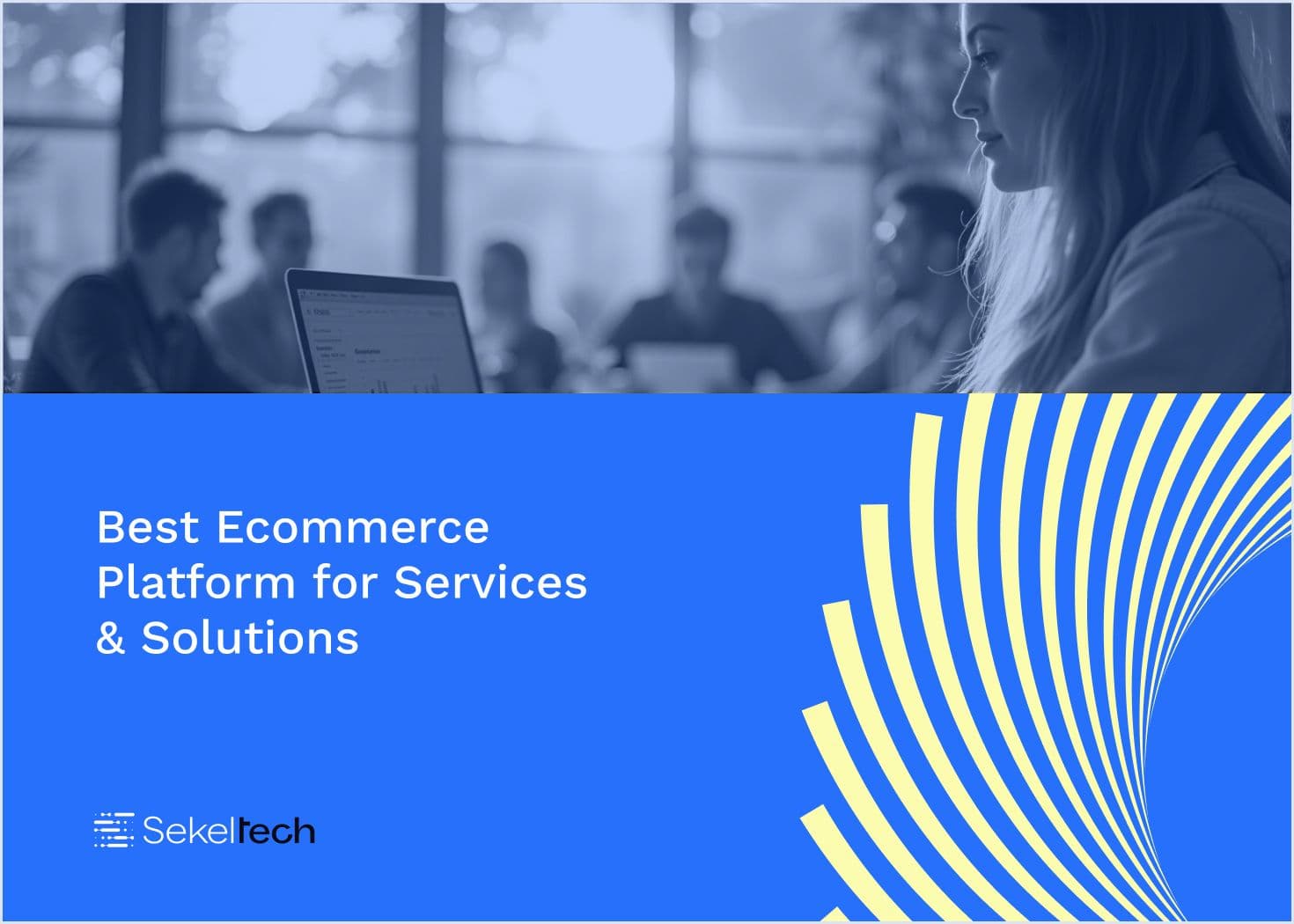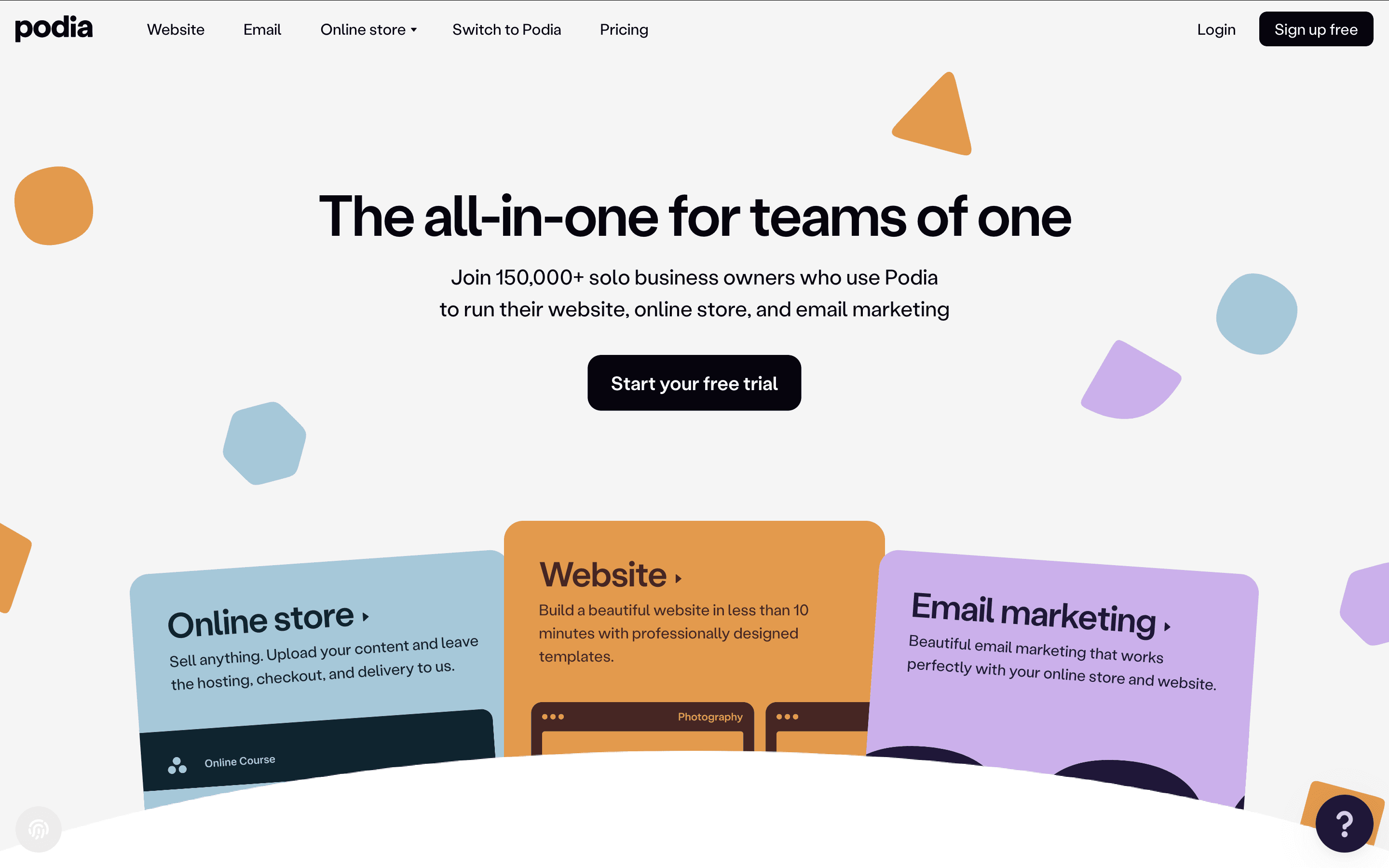Ecommerce
Best Ecommerce Platform for Services & Solutions in 2025
Thu, 13 Mar 2025 09:32:13 GMT
Speak to our Hyperlocal Expert

Need the best Ecommerce Platform for Services and Solutions? With businesses rapidly moving online, having the right Ecommerce Platform for Services is crucial for growth. Whether you’re a freelancer, consultant, or SaaS provider, a strong digital presence helps manage bookings, subscriptions, and payments effortlessly.
Unlike traditional ecommerce, service-based businesses require features like appointment scheduling, secure transactions, and real-time data analytics to track performance and improve customer engagement. A well-optimized Ecommerce Platform for Solutions streamlines operations and drives higher conversions.
With so many options available, how do you choose the right one? The best platforms offer ease of use, customization, security, marketing tools, and seamless integrations. In this guide, we’ll explore the 15 best Ecommerce Platforms for Services and Solutions in 2025 to help you find the perfect fit for your business.
What is an Ecommerce Platform for Services & Solutions?

An Ecommerce Platform for Services is a digital solution designed for businesses that offer services rather than physical products. These platforms enable freelancers, consultants, agencies, and SaaS providers to sell, manage, and deliver their services online efficiently. Similarly, an Ecommerce Platform for Solutions helps businesses streamline operations by integrating essential tools like appointment scheduling, subscription management, and secure payment processing.
Unlike traditional ecommerce platforms focused on selling products, service-based ecommerce platforms cater to businesses that require flexible booking systems, recurring payment options, and real-time communication tools. They prioritize automation, invoicing, and real-time data analytics to help businesses track performance and optimize service delivery.
Gain more valuable insights about Ecommerce with this enlightening article from The Economic Times, offering a wealth of information to expand your understanding.
Key Features of an Ecommerce Platform for Services & Solutions
1. Appointment Booking
Allows customers to schedule consultations or services seamlessly.
2. Subscription Management
Supports recurring billing for membership-based services.
3. Secure Payment Processing
Ensures smooth and safe transactions for customers.
4. Invoicing & Billing
Automates invoices for hassle-free financial management.
5. Real-time Data Analytics
Provides insights into customer behavior, sales trends, and service performance.
6. Marketing & CRM Tools
Helps businesses engage with customers and manage relationships effectively.
Choosing the right Ecommerce Platform for Solutions ensures businesses can automate processes, improve customer experience, and scale efficiently in the digital landscape.
Gain more insights with this short and informative video. "Ecommerce Platform for B2B & B2C: Detailed Guide for 2023"
Key Factors to Consider in an Ecommerce Platform
When selecting the right Ecommerce Platform for Services and Ecommerce Platform for Solutions, it’s essential to consider features that enhance both user experience and business efficiency. Below are the key features to look for:
1. User-Friendly Interface
A simple and intuitive interface ensures that both service providers and clients can navigate the platform easily. It should allow businesses to set up services, manage orders, and track payments without requiring technical expertise, while also ensuring a smooth experience for customers looking to book or purchase services.
2. Customizable Service Listings
Service providers need flexible options to present their offerings. Whether it’s a one-time consultation or a recurring service, the platform should allow customization of service categories, pricing, descriptions, and availability. This flexibility is crucial for catering to diverse service types and customer preferences.
3. Integrated Payment Gateways
A secure payment system is a must. The ecommerce platform should support multiple payment options, such as credit cards, digital wallets, and bank transfers, ensuring smooth and secure transactions for customers worldwide.
4. Booking & Scheduling System
For service-based businesses, a built-in booking and scheduling feature is vital. It allows customers to book appointments based on real-time availability, ensuring seamless service delivery and reducing administrative overhead.
5. Marketing & SEO Tools
To drive visibility and customer acquisition, the platform should include marketing and SEO tools. These features allow businesses to optimize their website for search engines, run promotions, and integrate with email marketing or social media platforms.
6. Scalability & Security
As businesses grow, their ecommerce platform must be able to scale accordingly. It should offer security features to protect both customer data and business transactions, ensuring trust and long-term growth.
7. Analytics & Reporting
Data-driven decision-making is crucial for business success. The platform should offer real-time conversion analytics and reporting tools to help businesses track key performance metrics, customer behavior, and sales trends, enabling informed decisions to improve service offerings and business strategies.
These key features ensure that an Ecommerce Platform for Solutions not only meets immediate business needs but also supports future growth and customer satisfaction.
Read Also - 10 Must-Have Features in B2C Ecommerce Platforms in 2025
15 Best Ecommerce Platforms for Services & Solutions in 2025
1. Sekel Tech - Best for All Types of Businesses

Key Features
AI-powered Hyperlocal Discovery, Omni-Commerce Platform, Content Management (CMS), Product Information Management (PIMS), Customer Data Platform (CDP), Geofencing, Store Locator, IVR System, AI Agents, Real-time Campaign Targeting.
Best Use Cases
Sekel Tech is ideal for retailers of all sizes seeking an all-in-one solution to manage their digital presence. It’s perfect for businesses looking to combine multiple functions, such as content management, customer data, and campaign targeting, under one unified platform.
Why Sekel Tech?
This platform is tailored for businesses aiming to scale, offering enterprise-grade capabilities like advanced billing management, first-party data collection, and personalized engagement—all from a single interface.
2. Shopify – Best for Small to Medium Service Businesses

Key Features
Easy setup, mobile-responsive themes, built-in payment gateway, marketing tools, secure hosting.
Best Use Cases
Shopify is perfect for small to medium-sized service businesses looking for an easy-to-use platform with robust e-commerce tools. It’s especially beneficial for those wanting a quick, professional online presence.
Why Shopify?
Its user-friendly interface and scalability make it an excellent choice for service-based businesses that need a straightforward setup without compromising on customization or marketing features.
3. WooCommerce – Best for WordPress Users Needing Full Customization

Key Features
Open-source, extensive plugin library, flexibility, customizable design, inventory management.
Best Use Cases
WooCommerce is ideal for service providers who are familiar with WordPress and need full control over their ecommerce store’s design and functionality.
Why WooCommerce?
WooCommerce offers flexibility and customization that makes it perfect for businesses that want a tailored solution with the added benefit of WordPress’s ease of use.
4. BigCommerce – Ideal for Scalable Service Solutions

Key Features
Advanced SEO tools, customizable checkout, multi-channel selling, unlimited products, robust analytics.
Best Use Cases
BigCommerce is best for growing service businesses that require scalability and a wide range of integrations. It's ideal for companies planning to expand rapidly.
Why BigCommerce
The platform’s scalability and enterprise-level features make it perfect for businesses that need a high-performance, long-term solution.
5. Wix Ecommerce – Best for Beginners and Freelancers

Key Features
Drag-and-drop builder, customizable templates, integrated payment gateways, SEO tools.
Best Use Cases
Wix is great for individuals or freelancers with little technical experience who need a simple, cost-effective way to sell services online.
Why Wix?
Its user-friendly drag-and-drop interface makes it easy for beginners to set up and manage their service-based ecommerce stores without needing coding skills.
6. Squarespace – Great for Creative Professionals Offering Services

Key Features
Beautiful templates, appointment booking integrations, mobile-friendly, SEO features.
Best Use Cases
Squarespace is best for creative professionals, such as photographers, designers, and consultants, who want a visually appealing website that doubles as a service sales platform.
Why Squarespace?
Known for its stunning design templates, it’s perfect for businesses needing both an elegant online presence and functional service management tools.
7. Magento (Adobe Commerce) – Best for Enterprises Needing Advanced Features

Key Features
Open-source, flexible APIs, robust security, multi-store capabilities, custom pricing.
Best Use Cases
Magento is ideal for large enterprises that need complex, customizable features and the ability to handle large volumes of services and transactions.
Why Magento?
It offers powerful ecommerce tools and customizability, making it an excellent choice for enterprises with specific needs.
8. Sellfy – Great for Selling Digital Services and Subscriptions

Key Features
Digital product selling, subscription management, easy-to-use design, built-in email marketing.
Best Use Cases
Sellfy is best suited for businesses that sell digital services such as ebooks, courses, or subscriptions, and want an easy-to-use platform for managing these offerings.
Why Sellfy?
It simplifies the process of selling digital services, making it perfect for content creators and subscription-based service providers.
9. Kajabi – Best for Online Courses and Coaching Businesses

Key Features
Course creation tools, membership management, email marketing, sales funnel features.
Best Use Cases
Kajabi is perfect for service businesses focused on online education, such as coaches, trainers, and course creators.
Why Kajabi?
It provides a robust set of tools to create, sell, and market online courses, making it the go-to platform for educators and coaches.
10. Podia – Ideal for Content Creators and Educators

Key Features
Course hosting, digital downloads, membership subscriptions, email marketing.
Best Use Cases
Podia is best for creators who want a platform that supports the sale of digital products like courses, memberships, and digital downloads.
Why Podia?
It’s easy to use, offers great value for money, and integrates all the tools educators need in one place.
11. ClickFunnels – Best for Service-Based Sales Funnels

Key Features
Pre-built funnels, landing pages, email automation, upsell capabilities.
Best Use Cases
ClickFunnels is ideal for businesses that focus on creating high-converting sales funnels to sell services and manage lead generation.
Why ClickFunnels?
Its specialized sales funnel features make it perfect for service providers looking to maximize conversions and automate the sales process.
12. Ecwid – A Budget-Friendly Option for Small Service Businesses

Key Features
Easy integration with any website, mobile-responsive, multiple payment options, inventory management.
Best Use Cases
Ecwid is perfect for small service businesses that need an affordable, easy-to-integrate solution to start selling services online.
Why Ecwid?
Its budget-friendly nature and simple setup make it ideal for small businesses and entrepreneurs with limited resources.
13. Weebly – Best for Simple Service-Based Ecommerce Needs

Key Features
Drag-and-drop builder, mobile optimization, email marketing tools, secure payment processing.
Best Use Cases
Weebly is perfect for small businesses or individuals offering straightforward services with minimal customization needs.
Why Weebly?
It offers simplicity and ease of use, making it a great choice for service businesses that need a no-fuss ecommerce solution.
14. Shift4Shop – Feature-Rich for Professional Service Providers

Key Features
Customizable storefront, SEO tools, automated invoicing, secure payment options, shipping integrations.
Best Use Cases
Shift4Shop is ideal for professional service providers who require a robust, feature-rich platform for managing services, payments, and customer relationships.
Why Shift4Shop?
With its comprehensive set of tools, it offers a high level of customization for businesses looking for advanced functionality.
15. GoDaddy Ecommerce – Best for Quick Service-Based Websites

Key Features
Easy-to-use interface, free hosting, mobile-optimized templates, integrated marketing tools.
Best Use Cases
GoDaddy Ecommerce is perfect for businesses needing to create and launch a service-based website quickly and easily.
Why GoDaddy?
Its simplicity, affordability, and quick setup make it an excellent choice for small service providers who need to get online fast.
Explore more platforms with this informative video. "Top 10 Ecommerce Platforms for Omnichannel Retail in 2023"
How to Choose the Right Ecommerce Platform for Your Business
When selecting an ecommerce platform for services and solutions, it’s important to evaluate several key factors that align with your business goals and growth potential.
1. Business Size and Scalability Needs
First, assess your business size and growth plans. Smaller businesses may benefit from simpler, budget-friendly platforms that are quick to set up and easy to manage. For larger businesses or those expecting significant growth, look for platforms that offer scalability and flexibility to accommodate more complex needs.
2. Ease of Use vs. Customization Options
If you're new to ecommerce, choose a platform that is user-friendly and requires minimal technical expertise. These platforms often provide templates and drag-and-drop features to simplify the setup process. However, if your business requires more advanced features or customization, consider platforms that allow for greater flexibility in design and functionality.
3. Evaluate Pricing Based on Budget and Features Required
Pricing plays a significant role in the decision-making process. Budget-conscious businesses may prefer cost-effective solutions that offer essential ecommerce features. On the other hand, if your business requires advanced functionalities such as subscription management or integration with third-party tools, you may need to consider platforms that come with a higher price tag but provide more value.
4. Look for Integrations (Payment, CRM, Analytics, etc.)
Ensure the platform integrates seamlessly with tools you rely on, such as payment gateways, customer relationship management (CRM) systems, and analytics tools. This will streamline your operations and allow for more efficient management of customer data and sales insights.
5. Check Platform Security and Customer Support Options
Security should be a top priority when choosing an ecommerce platform. Look for features like SSL certificates and encryption to protect customer information. Additionally, assess the platform’s customer support options, including availability and responsiveness, to ensure you can resolve any issues that may arise.
By carefully considering these factors, you can select the best ecommerce platform for services and solutions that suit your business's needs, growth objectives, and budget.
Read Also - 15 Best Ecommerce Platforms: Grow Your Online Store in 2025
Future Trends in Ecommerce for Services & Solutions
1. Rise of AI-Driven Personalization
AI is transforming ecommerce by delivering personalized experiences, increasing customer engagement. Studies show 80% of consumers are more likely to purchase from brands offering tailored services, boosting conversion rates and brand loyalty.
2. Growth of Voice Search and Mobile Commerce
Voice search and mobile commerce are rapidly growing. By 2025, 75% of households are expected to have smart speakers, and mobile shopping will account for 73% of total ecommerce sales, making it easier for customers to shop on the go.
3. Increasing Demand for Omnichannel Service Experiences
Consumers now expect seamless service across multiple channels. With 67% of shoppers using multiple touchpoints, businesses are integrating online and offline experiences to enhance customer satisfaction and retention.
4. Expansion of Subscription-Based Service Models
The subscription model is thriving, projected to reach $478.2 billion by 2025. Service-based businesses are increasingly adopting this model for steady revenue streams and improved customer retention.
Frequently Asked Questions (FAQs)
1. What is the best eCommerce platform for selling services?
The best eCommerce platform for selling services depends on your business needs. Popular platforms like Sekel Tech, Shopify, and BigCommerce provide features such as subscription management, appointment booking, and invoicing, tailored for service-based businesses.
2. What is SaaS in ecommerce?
SaaS (Software as a Service) in eCommerce refers to cloud-based software solutions that help businesses build, manage, and scale their online stores. These platforms eliminate the need for businesses to manage IT infrastructure by offering tools for inventory, payment processing, and customer management on a subscription basis.
3. Is SaaS B2B or B2C?
SaaS can cater to both B2B (Business-to-Business) and B2C (Business-to-Consumer) markets. Many SaaS platforms are designed for B2B businesses, providing enterprise-level solutions like CRM, marketing automation, and inventory management. However, there are also SaaS products designed for B2C businesses, focusing on direct-to-consumer services, like content creation tools or subscription-based models.
4. Is Sekel Tech a SaaS-Based Platform?
Yes, Sekel Tech is a SaaS-based platform. It offers a comprehensive, cloud-based solution that combines AI-driven hyperlocal discovery and omni-commerce tools, empowering businesses to manage their digital presence, track leads, and enhance customer engagement without the need for extensive infrastructure.
5. What is a CRM for eCommerce?
CRM (Customer Relationship Management) for eCommerce refers to software designed to help businesses manage customer interactions and data throughout the customer lifecycle. It enables businesses to personalize marketing, automate communications, manage customer service, and gain insights from customer behavior to improve retention and sales.
Conclusion
Choosing the right ecommerce platform for services or ecommerce platform for solutions is key to business success in 2025. The right platform helps streamline operations, improve customer experiences, and drive growth. Businesses should focus on scalability, customization, and integration when selecting the best fit.
For small to medium-sized businesses, user-friendly platforms with essential features are ideal, while larger businesses can benefit from more advanced, scalable solutions. Regardless of size, adopting a digital-first approach is essential to stay competitive and achieve long-term success.
Take Advantage of Sekel Tech's ecommerce platform for services and solutions
Unlock the full potential of Sekel Tech's ecommerce platform for services and solutions to streamline your operations and elevate customer experiences. With advanced features, AI-driven insights, and seamless integrations, Sekel Tech helps businesses of all sizes scale and stay competitive. Discover how Sekel Tech can transform your business today by contacting our experts for tailored solutions and support.
Read More Blogs -
1. Best Ecommerce Platform Software, Service Providers in 2025
2. 15 Best Ecommerce Platform Strategies for Online Growth
3. 10 Best Grocery Ecommerce Platforms for FMCG Brands
4. Best Ecommerce Platform for Clothing & Apparel Store in 2025
5. Top 10 Ecommerce Platforms for Omnichannel Retail in 2025
Share
Similar Blogs
Loved this content?
Sign up for our newsletter and get the latest tips & updates directly in your inbox.
There’s more where that came from!